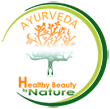Ayurveda has its roots in Indian medicine and literally means “the science of life ‘. Ayurveda is regarded as the oldest health system in the world and is officially recognized as healing method since 1977 by the WHO (World Health Organisation). This knowledge comes from the Vedas, the most ancient Indian scriptures, based on a holistic approach. Man is a physical, mental, emotional and spiritual unity. This means when there is a disturbance in one of these areas, it has its influence on the other areas. Both mental and physical imbalance lead to weakness and disease. The Ayurveda not only focuses on healing, but also on preventing disease and therefore maintaining vitality.
The 8 branches of Ayurveda
Internal medicine (kayachikitsa)
Surgery (shalya tantra)
ENT: ear/nose/throat/eye treatments (shalyakya tantra)
Pediatrics (kaumarabhritya)
Toxicology (agada tantra)
Psychology/psychiatry (bhutavidya)
Geriatrics/rejuvenation (rasayana)
Sexology/fertility/aphrodisiacs (vajikarana)
